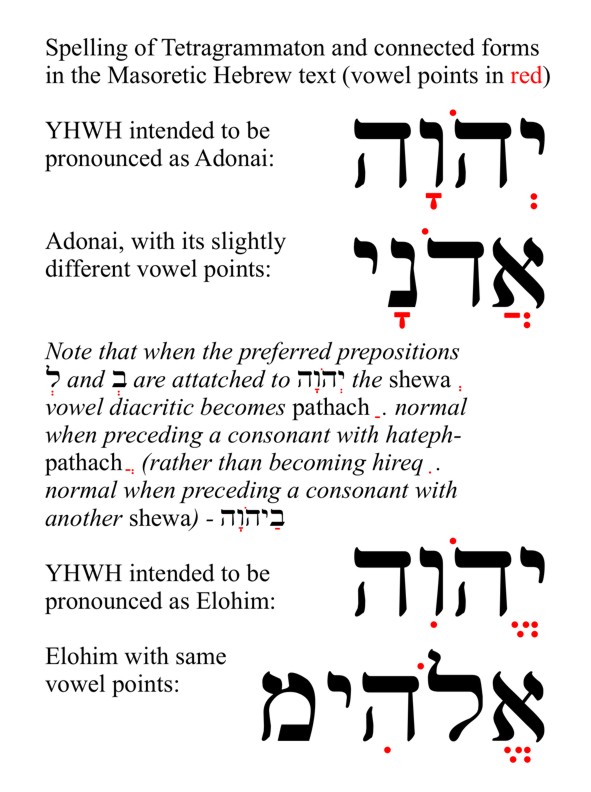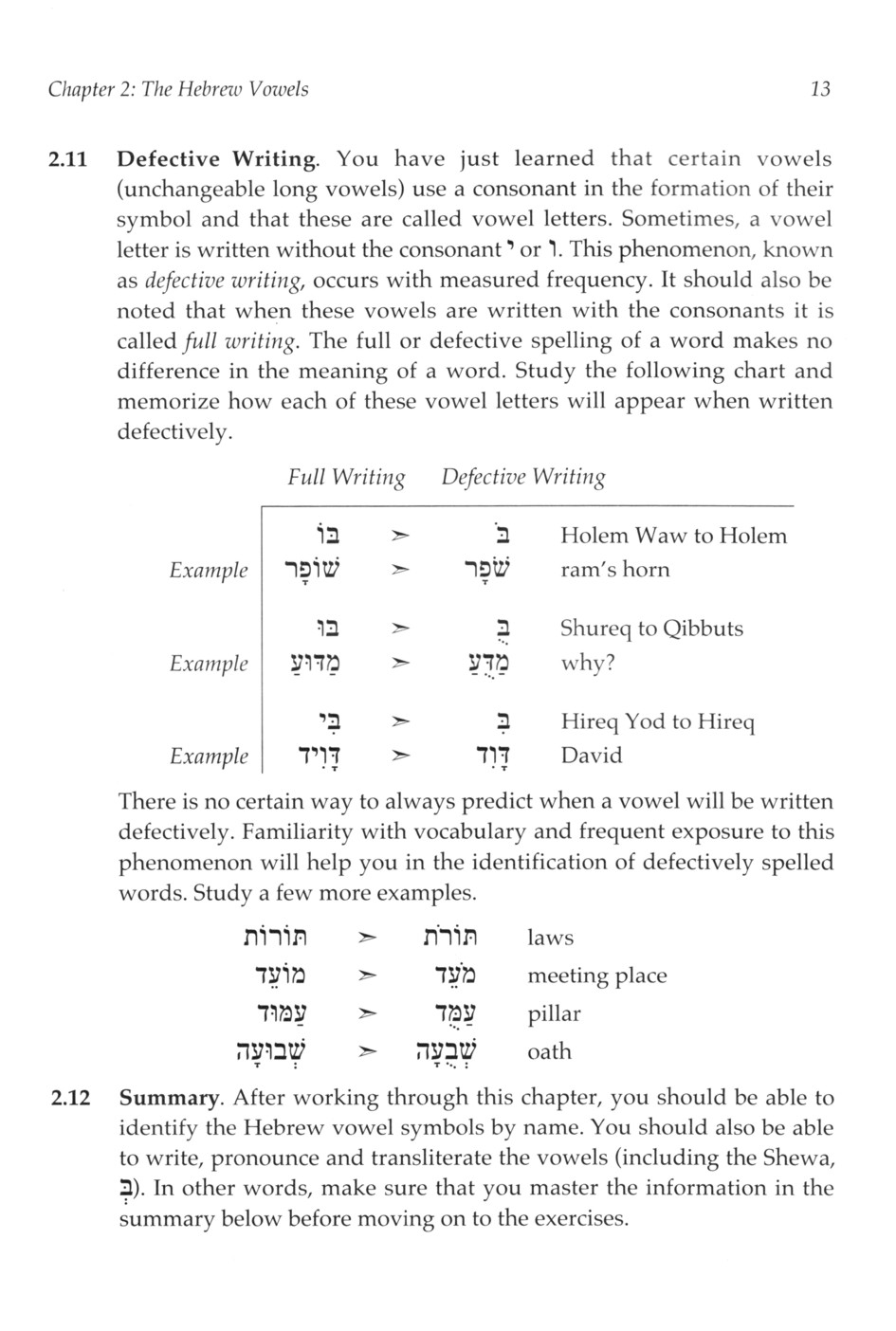THE NAME OF THE ALMIGHTY
The pronunciation of the Name of Yahweh should never be a contentious issue as we are all little children in His eyes and trying to pronounce His Set Apart Name could be likened to a child saying “dada” for the first time. The Name of the Almighty in modern Hebrew looks like this:
Hebrew is read from right to left, so the letters are as follows:
Like certain letters in the English language, a number of Hebrew letters have a vowel and a consonantsound and the majority of scholars and historians conclude that in the Name of YHWH, all the letters are sounded as vowels.
Or phonetically: YAHWEH
So joining the “YAH” with the “WEH” we get the familiar “YAHWEH”.
On one hand it does not matter so much how we spell the Name using English letter as we are attempting to transliterate the Name of the Almighty to be pronounced correctly. Various spelling attempts are acceptable ie.
YAHWEH, YAHUEH, YAHWAY, IAUE, etc.
A less common pronunciation gives a consonant sound to the “h” sounding: Ya-hoo-ah.
This pronunciation is in error as we note that all ancient records show that the Name of the Almighty is comprised of four vowels. For example, Josephus the 1st century C.E Jewish historian raised in the priesthood writes:
“His head was covered by a tiara of fine linen, wreathed with blue, encircling which was another crown, of gold, whereon were emblazoned the sacred letters, to wit, four vowels (φωνήεητα τέσσαρα; phonhenta tessara).”
The noted pagan Greek historian Diodorus (1st century B.C.E.) says:
“Among the Jews, Moses referred his laws to the deity who is invoked as Ἰαώ”
Ἰαώ is pronounced Ya’oo. There is no appearance of a consonantal ‘h’ pronounced; all are Greek vowelsapproximating the Hebrew vowels יהו (ee, ah, oo). The same pronunciation appears in the 2nd century C.E ‘Prayer of Jacob’ and also the ancient writers Origen, Irenaeus and Theodoret.
Many people jump to assumptions on how the Name should sound based on the sound of individual letters, but as with English, the pronunciation of a word or name can change depending on the placement and order of the letters contained in that name or word. Take for example the word:
Hear. (Heer)
Just adding a “d” to the end changes the sound of the word to:
Heard. (Herd)
If we add a “t” instead of a “d” it changes yet again to:
Heart. (Hart)
The Ya-HOO-aH pronunciation is also based on the premise that the name given to one of the sons of Ya’aqob (Jacob) of the twelve tribes of Yisra’ĕl is Yahudah (Judah) and has similar spelling to YHWH; in Hebrew:
Yod, Hay, Waw, Daleth, Hay.
The assumption is, that by removing the Daleth, the pronunciation would be YaHUaH
As well as the grammar issues mentioned above, the “h” sound ‘hay'(ה) is often silent in Hebrew which is why our Anglocized version is pronounced “Judah” and not “Jahudah”. Even modern Hebrews pronounce this name “Yudah”.
Probably the most convincing evidence that the Name of the Almighty is pronounced YAHWEH is the support of ancient documentation, whereas there is not one source that supports the pronunciation: Yahuah.
Clement of Alexandria (140 AD – 215 AD) writes that the Sacred Name is Ἰαουέ and Ἰαουαί both forms approximating the pronunciation Yahweh. In various Jewish-Egyptian papyri it is most frequently written Ἰαωουηε but also appears Ἰαωουηι, Ἰαωουεη, Ἰαωουε and Ἰαωουεα (all approximating Yah-ou-ay). It should not go unnoticed that these Greek writers all use vowels to represent the Name of the Almighty.
Further evidence of the ‘h’ not being pronouced is found in the Septuagint. ישׁעיה (Yesha-yah [Isaiah]) is also found as ישׁעיהוּ (Yesha-yahu). The LXX renders Yasha-yahu Ἡσαία (Yesa-eeah), showing the intercangeability between יהו and יה; Ἰεσσίου (Yess-eeou); and Ἡσαίου (Yesa-eeou).
The other major problem with the pronunciation of Yahuah is that the accent is emphasised on the ‘hu’ – Ya-HOO-ah whereas the accent on Hebrew words is nearly ALWAYS on the LAST SYLLABLE therefore Yah-WEH is in accordance with the rules of Hebrew.
There is an erroneous claim being presented that the that the last vowel was changed from Yahwah to Yahweh by the Greeks due to the masculine form being Yahweh using Noah – Noe as an example. The masculine form of a name actually requires an ‘ς'(s) NOT an ‘ε'(e). For example: Joshua (Yahoshua) – Iesous, Matthew – Matthias, Eliyah – Elias, Jonah – Jonas, Jeremiah – Jeremias, etc… The name of Noah does not end with the Hebrew letter ‘hay’(ה), but ‘chet'(ח) ie. Noach and cannot be compared to any of the names ending with a ‘hay’(ה) let alone the Sacred Name of Yahweh when transliterated into Greek.
Another example of misinformation is that Hebrew words ending in ‘hay'(ה) by default end with an ‘ah’ sound. This is not at all the case and as well as Nineweh many famous names in Scripture (not to mention words) ending in ‘hay'(ה) end with ‘eh’ for example: Mosheh/Moses (משׁה), Manashsheh/Manasseh (מנשּׁה), Yephunneh/Jephunneh (יפנּה) etc.
Another example can be provided when Yahweh reveals Himself fully to Mosheh in the phrase:
“I AM THAT I AM” – Heb. אהיה אשׁר אהיה (AYEH ASHER AYEH)
The Hebrew word AYEH (אהיה)is derived from the word HAYAH (היה) originally HAWAH (הוה) yet in this grammatical form is, of course pronounced AYEH, therefore a ‘Hay’ at the end of a word does not automatically make an ‘AH’ sound.
Another fallacy being presented is that the Masorites vowel pointed the Name YHWH to read Yahweh to disguise it from being spoken… The opposite is the case! The Masorites were a group of Jewish scribes who, up to 1000 years after the Messiah indeed DID add vowel points to the Hebrew writings and DID disguise the pronounciation of the Name YaHWeH to be read as YeHoWaH (Adonai) or YeHoWiH (Elohim) and in the first instance (which is by far the more common) actually resembles YaHuWaH which we can conclude is the incorrect pronunciation.

SUMMARY
To summarise all the above, we find through history that all the ancients knew the pronunciation of the Name of the Almighty and approximated in their various languages the form: YaHWeH
It wasn’t till nearly 1000 years later that the Jewish scribes vowel pointed it to YeHoWaH. Are we seriously to believe the claims of some (often Christians defending their traditions) that the Almighty Yahweh hid His Name from the entire world for nearly 2000 years, only to reveal it to us in the last days… Or did He indeed preserve His Name through the earliest writings to reveal it to those who love Him and guard His Commands and diligently seek Him? The truth is, He promised He would reveal Himself to those who obey:
John 14:21 “He who possesses My commands and guards them, it is he who loves Me. And he who loves Me shall be loved by My Father, and I shall love him and manifest Myself to him.”
Yahushua made known His Father’s Name to all those who would love Him:
John 17:26 “And I have made Your Name known to them, and shall make it known, so that the love with which You loved Me might be in them, and I in them.”
FURTHER STUDY
For an in-depth 300 page study on the Name of Yahweh with many historical references covering the use and abuse and pronunciation click the button below:
 Pay close attention to Chapter 9
Pay close attention to Chapter 9
Note: Certain portions of the study are not necessarily the views of 2besaved.com
THE NAME OF THE MESSIAH
The Name of the Messiah also has a number of varying pronunciations among believers; some understandably diverse and some not so logical or factual.
The Name of the Messiah in modern Hebrew looks like this:
Reading from right to left, the letters are as follows:
The first three letters form part of the tetragrammaton from the Father’s Name YaHW. The Shin is vowel pointed with a Qibbuts giving us a Shu. And the final letter being an Ayin is vowel pointed with a Patach giving the Ah sound.
putting it all together gives: ee-ah-oo-shu-ah
phonetically: YAHUSHUA
Note: there is no emphasis in the ‘H’ in His Name as this appears in Hebrew as a vowel and is no mare than a breathing sound almost rendering the pronunciation: YAHWSHUA.
One of the more common errors of the pronunciation has been passed down from Jewish tradition of not being allowed to speak the Name of Yahweh thereby abbreviating Yahushua’s Name to Y’shua, which in English has been rendered Yeshua. Y’shua in Hebrew simply means ‘salvation’ and the error here is obvious. By obliterating Yah from the Name of the Son, this could be considered blasphemous. See article below:

Some favour the pronunciation:Yahusha assuming that because there is no waw between the shin and the ayin it cannot be Yahushua. Those who follow this premise are obviously not aware of “defective writing” in the Hebrew language. This phenomenon occurs with measured frequency in the Hebrew texts where sometimes a vowel letter is written without the contonant yod (י) or waw (ו). For example the name of Dawid occurs a majority of time in Scripture without the yod. For example here is an exerpt from ‘Basics of Biblical Hebrew’:

The word ‘sha’ does not exist as a stand alone word, whereas ‘shua’ (shin, waw, ayin or shin, ayin) exists in a number of forms and has various meanings ranging from ‘cry for help’ to ‘wealth’ with the root meaning of the word being ‘freedom’. Furthermore, there are a number of names in Scripture that end with ‘shua’ spelled either fully – shin, waw, ayin or defectively – shin, ayin. eg:
Elishua (אלישׁוּע – the full form of Elisha), Malkishua (לכּישׁוּע) , Abishua (אבישׁוּע), Bathshua (בּת־שׁוּע) and of course Joshua – properly Yahoshua (defective: יהושׁע or full: יהושׁוּע)
There is no other names in Scripture other than Elisha (the abbreviated form of Elishua) that end in ‘sha’ that have the meaning of ‘deliverance’ or ‘salvation’ or anything remotely close to the meaning of ‘shua’.
CONCLUSION
The Name of the Messiah contains the Father’s Name as Scripture says:
John 17:12 “When I was with them in the world, I was guarding them in Your Name which You have given Me…”
The Name of the Messiah means ‘Yahweh is salvation’ – Yahu-shua and is spelled in Hebrew exactly the same as the successor to Mosheh and יהושע (Yahoshua) the son of the High Priest in Zecharyah who was given this prophecy:
Zecharyah 6:11-12 “And you shall take the silver and gold, make a crown, and set it on the head of Yahoshua the son of Yahotsadaq, the kohen ha’gadol, 12 and shall speak to him, saying, ‘Thus said YHWH of hosts, saying, “See, the Man whose name is the Branch! And from His place He shall branch out, and He shall build the Hĕykal of YHWH.”
YAHUSHUA is the Branch prophesied from times of old.




